人教版英语八年级下册Unit1 知识点精讲
最全面人教版八年级下册英语第一单元知识点归纳总结

Unit 1 What's the matter?一、词汇与短语◆重点单词A部分1.matter n. 问题;事情2.sore adj. 疼痛的;酸痛的3.stomachache n. 胃痛;腹痛4.foot n. 脚;足5.neck n. 颈;脖子6.stomach n. 胃;腹部7.throat n. 咽喉;喉咙8.hurt v. (使)疼痛;受伤9.fever n. 发烧10.passenger n. 乘客;旅客11.lie v. 躺;平躺12.break n. 间歇;休息13.rest v. &n. 放松;休息14.onto prep. 向;朝15.X-ray n. X射线;X光16.trouble n. 问题;苦恼17.toothache n. 牙痛18.hit n. (用手或器具)击;打19.headache n. 头痛20.herself pron. (she的反身代词)她自己21.off adv. & prep. 离开(某处);不工作;从……去掉B部分1.bandage n. 绷带v. 用绷带包扎2.press v. 压;挤;按3.sick adj. 生病的;有病的4.knee n. 膝;膝盖5.breathe v. 呼吸6.knife n. 刀7.sunburned adj. 晒伤的8.blood n. 血9.ourselves pron. (we反身代词)我们自己10.mean v. 意思是;打算11.climber n. 登山者;攀登者12.importance n. 重要性;重要13.risk n.&v. 危险;风险;冒险14.decision n. 决定;抉择15.accident n.(交通)事故;意外遭遇16.control v.&n. 限制;约束;管理17.situation n. 情况;状况18.spirit n. 勇气;意志19.kilo( = kilogram) n. 千克;公斤20.death n. 死;死亡21.rock n. 岩石22.nurse n. 护士◆重点短语A部分1.have a cold 感冒2.lie down 躺下3.have a stomachache 胃痛4.take one's temperature 量体温5.have a fever 发烧6.to one's surprise 使……惊讶的是7.get off 下车8.right away 立即;马上9.take breaks (take a break) 休息10.talk too much 说得太多11.drink enough water 喝足够的水12.have a very sore throat 嗓子非常疼13.get an X-ray 拍X光片14.see a dentist 看牙医15.drink some hot tea with honey 喝一些加蜂蜜的热茶16.put some medicine on sth.在……上面敷一些药17.feel very hot 感到很热18.sound like 听起来像19.all weekend 整个周末20.in the same way 以同样的方式21.go to a doctor 看医生22.go along 沿着……走23.on the side of the road 在马路边24.shout for help 大声呼救25.without thinking twice 没有多想26.have a heart problem 有心脏病27.thanks to 多亏了;由于28.in time 及时29.save a life 挽救生命30.get into trouble 陷入麻烦31.hurt oneself 受伤32.fall down落下;摔倒B部分1.be used to 习惯于……;适应于……2.in a difficult situation 在困境中3.take risks (take a risk) 冒险4.keep on doing sth. 继续(或坚持)做某事5.run out (of) 用尽;耗尽6.make a decision 作出决定7.cut off 切除8.get hit on the head 撞到头部9.get out of 离开;从……岀来10.be interested in 对……感兴趣11.give up 放弃12.mean doing sth. 意味着做某事13.put a bandage on sth. 用绷带包扎…14.lose one's life 失去生命15.feel sick 感到恶心16.mountain climbing 登山运动17.have problems breathing 呼吸困难18.be in control of 掌管;管理◆重点句子A部分1.What's the matter with you?=What's the trouble with you?=What's wrong with you?你怎么了?2.What should she do? 她该怎么办呢?3.Did you fall down? 你跌倒了吗?4.Should I take my temperature? 我应该量一下体温吗?5.I think I sat in the same way for too long without moving.我想我以同样的姿势一动不动地坐得太久了。
人教版八年级英语下册Unit1知识点归纳
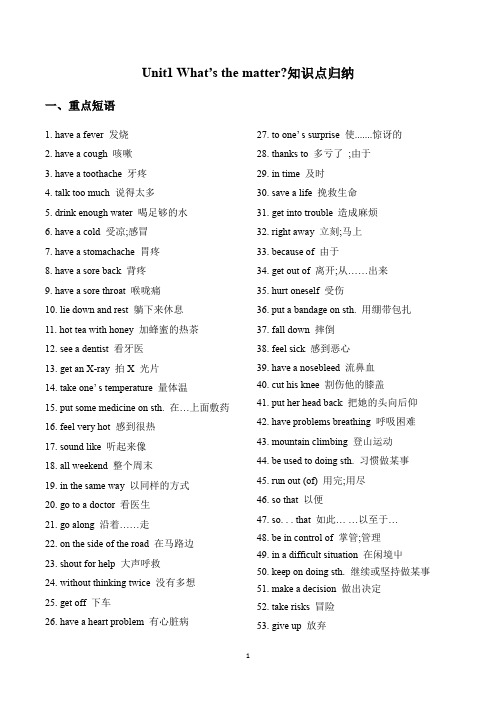
Unit1 What’s the matter?知识点归纳一、重点短语1. have a fever 发烧2. have a cough 咳嗽3. have a toothache 牙疼4. talk too much 说得太多5. drink enough water 喝足够的水6. have a cold 受凉;感冒7. have a stomachache 胃疼8. have a sore back 背疼9. have a sore throat 喉咙痛10. lie down and rest 躺下来休息11. hot tea with honey 加蜂蜜的热茶12. see a dentist 看牙医13. get an X-ray 拍X 光片14. take one’ s temperature 量体温15. put some medicine on sth. 在…上面敷药16. feel very hot 感到很热17. sound like 听起来像18. all weekend 整个周末19. in the same way 以同样的方式20. go to a doctor 看医生21. go along 沿着……走22. on the side of the road 在马路边23. shout for help 大声呼救24. without thinking twice 没有多想25. get off 下车26. have a heart problem 有心脏病27. to one’ s surprise 使.......惊讶的28. thanks to 多亏了;由于29. in time 及时30. save a life 挽救生命31. get into trouble 造成麻烦32. right away 立刻;马上33. because of 由于34. get out of 离开;从……出来35. hurt oneself 受伤36. put a bandage on sth. 用绷带包扎37. fall down 摔倒38. feel sick 感到恶心39. have a nosebleed 流鼻血40. cut his knee 割伤他的膝盖41. put her head back 把她的头向后仰42. have problems breathing 呼吸困难43. mountain climbing 登山运动44. be used to doing sth. 习惯做某事45. run out (of) 用完;用尽46. so that 以便47. so. . . that 如此… …以至于…48. be in control of 掌管;管理49. in a difficult situation 在闲境屮50. keep on doing sth. 继续或坚持做某事51. make a decision 做出决定52. take risks 冒险53. give up 放弃二、用法归纳1.need to do sth.需要去做某事2.see sb. doing sth.看见某人正在做某事3.ask sb. sth.询问某人某事4.expect sb. to do sth.期望某人做某事5.agree to do sth.同意做某事6.help sb. ( to ) do sth.帮助某人做某事7.want to do sth.想要做某事8.tell sb. To do sth.告诉某人做某事9.have problems (in) doing sth.做某事有困难e sth. To do sth. 用某物去做某事11.be/get used to doing sth.习惯于做某事12.seem to do sth.好像做某事13.keep on doing sth.继续做某事14.mind doing sth.介意做某事三、重点句型1. What’ s the matter? 你怎么了?What’ s the matter with you? = What’s the trouble with you? = What’ s wrong with you?2. What should she do? 她该怎么办呢?Should I take my temperature? 我应该量一下体温吗?主语+ should/shouldn’t + 动词原形. ..①You should lie down and rest.你应该躺下休息一会儿。
最新新人教版八年级英语下册unit1知识点说课讲解
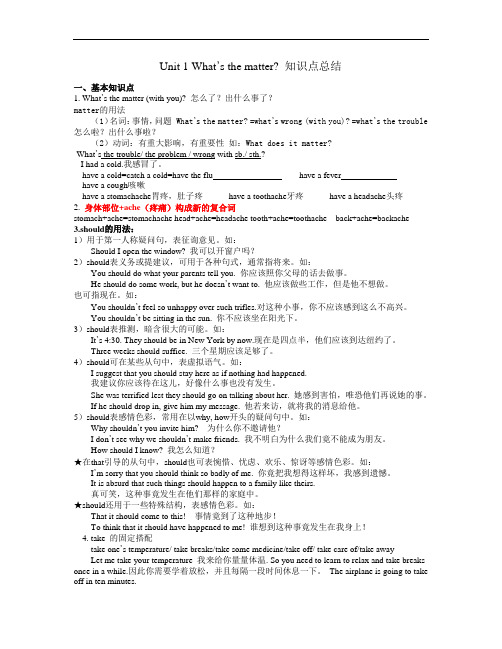
Unit 1 What’s the matter? 知识点总结一、基本知识点1. What’s the matter (with you)? 怎么了?出什么事了?matter的用法(1)名词:事情,问题 What’s the matter? =what’s wrong (with you)? =what’s the trouble 怎么啦?出什么事啦?(2)动词:有重大影响,有重要性如:What does it matter?-What’s the trouble/ the problem / wrong with sb./ sth.?-I had a cold.我感冒了。
have a cold=catch a cold=have the flu have a feverhave a cough咳嗽have a stomachache胃疼,肚子疼have a toothache牙疼have a headache头疼2. 身体部位+ache(疼痛)构成新的复合词stomach+ache=stomachache head+ache=headache tooth+ache=toothache back+ache=backache3.should的用法:1)用于第一人称疑问句,表征询意见。
如:Should I open the window? 我可以开窗户吗?2)should表义务或提建议,可用于各种句式,通常指将来。
如:You should do what your parents tell you. 你应该照你父母的话去做事。
He should do some work, but he doesn’t want to. 他应该做些工作,但是他不想做。
也可指现在。
如:You shouldn’t feel so unhappy over such trifles.对这种小事,你不应该感到这么不高兴。
You shouldn’t be sitting in the sun. 你不应该坐在阳光下。
人教版八年级下册unit1知识点总结
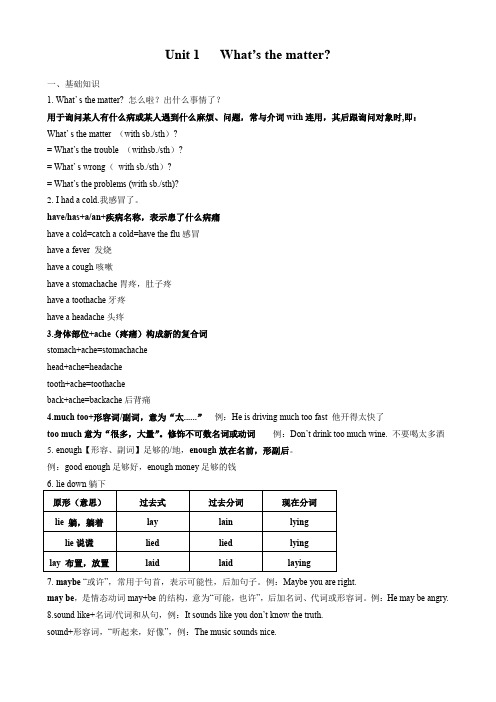
Unit 1 What’s the matter?一、基础知识1. What’ s the matter? 怎么啦?出什么事情了?用于询问某人有什么病或某人遇到什么麻烦、问题,常与介词with连用,其后跟询问对象时,即:What’ s the matter (with sb./sth)?= What’s the trouble (withsb./sth)?= What’ s wrong(with sb./sth)?= What’s the problems (with sb./sth)?2.I had a cold.我感冒了。
have/has+a/an+疾病名称,表示患了什么病痛have a cold=catch a cold=have the flu感冒have a fever 发烧have a cough咳嗽have a stomachache胃疼,肚子疼have a toothache牙疼have a headache头疼3.身体部位+ache(疼痛)构成新的复合词stomach+ache=stomachachehead+ache=headachetooth+ache=toothacheback+ache=backache后背痛4.much too+形容词/副词,意为“太......”例:He is driving much too fast 他开得太快了too much意为“很多,大量”。
修饰不可数名词或动词例:Don’t drink too much wine. 不要喝太多酒5.enough【形容、副词】足够的/地,enough放在名前,形副后。
例:good enough足够好,enough money足够的钱7. maybe “或许”,常用于句首,表示可能性,后加句子。
例:Maybe you are right.may be,是情态动词may+be的结构,意为“可能,也许”,后加名词、代词或形容词。
人教版八年级英语下册Unit1知识点
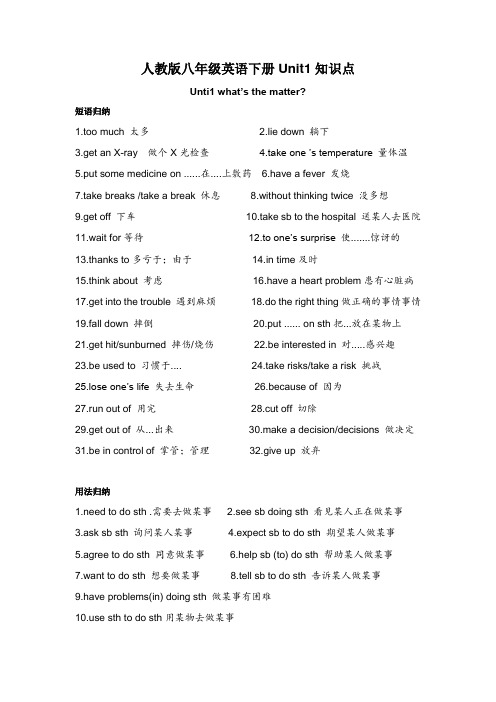
人教版八年级英语下册Unit1知识点Unti1 what’s the matter?短语归纳1.too much 太多2.lie down 躺下3.get an X-ray 做个X光检查4.take one ’s temperature 量体温5.put some medicine on ......在....上敷药6.have a fever 发烧7.take breaks /take a break 休息8.without thinking twice 没多想9.get off 下车10.take sb to the hospital 送某人去医院11.wait for等待12.to one’s surprise 使.......惊讶的13.thanks to多亏于;由于14.in time及时15.think about 考虑16.have a heart problem患有心脏病17.get into the trouble 遇到麻烦18.do the right thing做正确的事情事情19.fall down 摔倒20.put ...... on sth把...放在某物上21.get hit/sunburned 摔伤/烧伤22.be interested in 对.....感兴趣23.be used to 习惯于.... 24.take risks/take a risk 挑战25.lose one’s life 失去生命26.because of 因为27.run out of 用完28.cut off 切除29.get out of 从...出来30.make a decision/decisions 做决定31.be in control of 掌管;管理32.give up 放弃用法归纳1.need to do sth .需要去做某事2.see sb doing sth 看见某人正在做某事3.ask sb sth 询问某人某事4.expect sb to do sth 期望某人做某事5.agree to do sth 同意做某事6.help sb (to) do sth 帮助某人做某事7.want to do sth 想要做某事8.tell sb to do sth 告诉某人做某事9.have problems(in) doing sth 做某事有困难e sth to do sth用某物去做某事11.be/get used to doing sth 习惯于做某事12.seem to do sth 好像做某事13.keep on doing sth 继续做某事14.mind doing sth 介意做某事语法点1.询问某人的健康问题及遇到麻烦的表达方法2.情态动词should的用法3.不定代词的用法精细解读1. What’s the matter (with you)? 怎么了?出什么事了?What’s the trouble/ the problem / wrong with sb./ sth.?2. I had a cold.我感冒了。
人教版英语八年级下册 Unit 1 单元话题重点知识点精讲精练
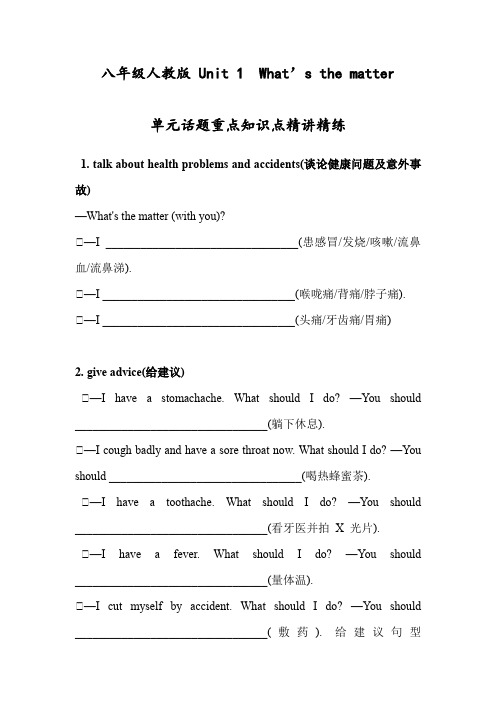
八年级人教版 Unit 1 What’s the matter单元话题重点知识点精讲精练1. talk about health problems and accidents(谈论健康问题及意外事故)—What's the matter (with you)?①—I _________________________________(患感冒/发烧/咳嗽/流鼻血/流鼻涕).①—I _________________________________(喉咙痛/背痛/脖子痛). ①—I _________________________________(头痛/牙齿痛/胃痛)2.give advice(给建议)①—I have a stomachache. What should I do? —You should _________________________________(躺下休息).①—I cough badly and have a sore throat now. What should I do? —You should _________________________________(喝热蜂蜜茶).①—I have a toothache. What should I do? —You should _________________________________(看牙医并拍X 光片).①—I have a fever. What should I do? —You should _________________________________(量体温).①—I cut myself by accident. What should I do? —You should _________________________________(敷药). 给建议句型___________________________________________________________ _______________________________________重点知识点:①matter n.问题;事情What's the matter ___________ you?(matter 可换成___________)What's ___________ with you? What happened ___________ you?matter v.要紧;有重大影响;事关紧要It doesn't matter.没关系The only thing that really matters is what the wall looks like when we are done and how much fun we have painting it.唯一重要的事情是当我们结束时墙的样子以及我们在刷墙过程中得到多少快乐。
人教八下unit1知识点
人教八下unit1知识点人教八年级下册英语Unit 1:How often do you exercise?知识点总结Unit 1的主题是“你多久锻炼一次”,主要通过谈论日常活动的频率来交流。
以下是本单元的主要知识点总结:一、词汇2. Daily activities:exercise(锻炼)、jog(慢跑)、play basketball(打篮球)、ride a bike(骑自行车)、dance(跳舞)、watch TV(看电视)、read(读书)、do homework(做作业)、water plants(浇花)、draw pictures(画画)、help parents(帮助父母)、take photos(拍照)、clean the house(打扫房间)3. Verbs: like(喜欢)、enjoy(享受)、love(喜爱)、hate(讨厌)、prefer(更喜欢)、mind(介意)、practice(练习)、play (玩、打)二、句子1. How often + do + 主语 + 动词原形?表达“多久一次做事”例句:How often do you exercise?(你多久锻炼一次?)2. Adverbs of frequency的用法- always, usually, often位于动词前例句:I always eat breakfast.(我总是吃早餐。
)3. I enjoy/like/love/hate + 动名词例句:I enjoy dancing.(我喜欢跳舞。
)4.表示周、月的时间段的用法- on + 星期几例句:I play basketball on Fridays.(我星期五打篮球。
)- on + 日期例句:I have English class on February 1st.(我2月1日有英语课。
)- in + 月份例句:We have a holiday in July.(我们七月有假期。
(完整)人教版英语八年级下册第一单元知识点,文档
人教版英语八年级下册第一单元知识点Unit 1 What ’s the matter?【单词】matter /'m?t ?/ n. 问题 ; 事情What ’s the matter 〔 with sb. 〕?怎么啦?出什么事情了?咨询有什么病或碰到什么麻烦、问题sore /s ?:/ adj. 难过的 ,酸痛的;愤慨的--have a sore back 后背痛 --sore throat 咽喉痛n. 溃疡,痛点;恨事pressure sore 褥疮, sore spot 伤疤,痛点;伤心事,旧疮疤stomachache ['st ?m?ke?k] n. 胃痛 ; 腹痛 stomach /'st ?m?k/ n. 胃; 腹部 foot /f ?t/ n. 脚 ; 足pl. feet-- on foot 步行;在进行中-- at the foot of 在 〔山〕脚下;在的下部neck /nek/ n. 颈 ; 脖子--necklace 项链 -- necktie 领带 --neck and neck (with sb.)(与 )齐驱并驾,不分上下throat / θ r? 咽喉;喉咙t/ n.fever /'fi:v ?/ n. 发热have a fever 发热lie /la ?/ -- vi. 躺 , 平躺;位于,存在lie down 躺下--vi. 谎言,作为不及物动词的变化: p.pr -- lying ,pt-- lied ,pp —lied--vt. 下蛋;放置 e.g., The hen stopped laying eggs. She laid the baby down gently on the bed.作为及物动词是的变化: p.pr -- laying ,pt-- lay ,pp —lainrest v.& n. 放松 ; 休息 cough n.& v. 咳嗽X-rayn. X 射线 ; X 光toothache/'tu:?牙痛θe k/n.temperature 温度,体温take one' s temperature 量体温headache/'hede ?k/ n. 头痛break?k/ n. 间歇;休息take breaks (take a break) 休息/brevi. vt. pt-- broke ,pp —broken--break away (from) 走开,放弃〔习惯〕 ,打破〔陈套〕--break down (机器等 )坏了; (方案等 )失败; (健康等 )变坏;感情失去控制 --break in 插嘴,使驯服--break into 破门而入,突然。
(完整版)人教八年级下册Unit-1知识点详解,推荐文档
unit 11. What’s the matter (with you)? 怎么了?出什么事了?What’s the trouble/ the problem / wrong with sb./ sth.? = What’s up? = What happens to sb.? 【注】:matter 和trouble 为名词,其前可加the 或形容词性物主代词, wrong 是adj. 不能加the. 【习】:—What’s the matter ______ Tom. He is wet through. —His car ran _______ the river.A.with; inB.to; intoC.with; into【拓展】matter的用法(1) It doesn’t matter 没关系(用来回答别人道歉时的用语)【习】:—I’m very sorry. I broke your tea cup. —__________.A. It doesn’t matterB. You’d better notC. T ake it easyD. It’s too bad(2) as a matter of fact= in fact 事实上, 实际上2.I had a cold. 我感冒了。
疑问&否定have a/an + 疾病名词“患……病”(cold/fever/cough) have an accidenthave a sore ( 因发炎引起的肌肉疼) throat/back 患喉咙/背痛have a heart problemhave a fever 发烧have a cold =catch a cold 患感冒have a stomachache 患胃痛have a toothache患牙痛have a nosebleed 流鼻血have a headache 患头痛have a backache患背痛have a cough咳嗽其他:cut+身体器官hurt+身体器官get hit ( V-ed ) on the head(by sth.)摔在头上【习】:I didn’t sleep well last night, because I _____ a toothache .A. wasB. wentC. hadD. tookhave ( some ) problems ( in ) doing 做某事有困难back n 背;背部at the back of......在......的后面go/come back 返回give back 归还hand n. 手V. 交给;传递hand in hand 手拉手hand in 上交hand on 依次传递hand out 分发3. 身体部位+ache(持续性的疼痛)构成新的复合词stomach+ache=stomachache head+ache=headachetooth+ache=toothache back+ache=backache【习】:Mr. Smith eats ______ food, so he’s _____ fat.A .much too; too muchB .too many; much tooC. too much; too muchD. too much ;much tooenough 的用法(1) adj.足够的,充分的。
人教版八年级下册英语Unit1单元知识点总结
Unit1 What’s the matter?一、重点短语归纳Section A:have a cold 感冒 have a stomachache 胃痛 have a sore throat 嗓子痛 too much 太多 lie down 躺下 take one’s temperature 量体温 have a fever 发烧 have a headache 头痛 sound like 听起来像 take breaks 休息 go to a doctor 去看医生 get off 下车 to one’s surprise 使...惊讶的 Thanks to...多亏 in time 及时right away 立即;马上 get into trouble 陷入麻烦 fall down 摔倒 Section B:be interested in... 对...感兴趣 be used to 习惯于...... take risks 冒险 because of 因为 run out 用尽 have problems breathing 呼吸困难save one’s life 挽救某人的生命 cut off 切除 get out of 离开;从...中出来be in control of 掌管 the importance of... ...的重要性 give up 放弃 so...that... 如此...以至于...二、重点词组用法归纳1、have a/an +疾病名称 “患....病” (ex: have a cold, have a fever)2、have a sore +身体部位“.....痛” (ex: have a sore back, have a sorethroat)3、①too much(太多) 用作副词词组,位于动词后修饰动词(ex: eat too much 吃太多)②too many 意为“太多”,用作形容词词组,位于可数名词复数前修饰名词(ex: too many friends 太多朋友)③much too 意为“太...”位于形容词或副词前修饰形容词(ex: much too fast 太快)4、need to do sth. 需要做某事5、6、expect sb. to do sth. 期望某人做某事 7、8、9、tell sb (not)to do sth 告诉某人(不要)做某事10、have problems (in) doing sth. =have trouble (in) doing sth. 意为“做某事有困难”11、be ready to do sth. 准备好做某事12、keep on doing sth 继续做某事13、mind doing sth. 介意做某事 三、语法重点(一)情态动词should 的用法should 意为“应该;应当;可以”,用以表达职责和义务、提出建议或劝告。
- 1、下载文档前请自行甄别文档内容的完整性,平台不提供额外的编辑、内容补充、找答案等附加服务。
- 2、"仅部分预览"的文档,不可在线预览部分如存在完整性等问题,可反馈申请退款(可完整预览的文档不适用该条件!)。
- 3、如文档侵犯您的权益,请联系客服反馈,我们会尽快为您处理(人工客服工作时间:9:00-18:30)。
Unit1 知识点精讲
【重要词汇概览】
◆ matter n.事情,问题,差错
◆ arm n.臂,胳膊
◆ back n.后背,背脊
◆ ear n.耳朵
◆ eye n.眼睛
◆ foot n.脚,足(复数. feet)
◆ leg n.腿,腿部
◆ neck n.脖子,颈部
◆ nose n.鼻子
◆ stomach n.胃,胃部
◆ tooth n.牙齿(复数. teeth)
◆ sore adj.疼痛的
◆ stomachache n.胃痛,腹痛,肚子痛
◆ throat n.喉头,喉咙
◆ toothache n.牙痛
◆ fever n.发烧
◆ lie v.躺,卧,平放在某处(lay, lain)
◆ honey n.蜂蜜
◆ dentist n.牙医
◆ illness n.疾病,生病
◆ advice n.劝告,忠告,建议
◆ backache n.背痛
◆ importance v. 重要性;重要
◆ headache n. 头痛
◆ death n. 死;死亡
◆nurse n. 护士
◆ knife n. (复数.knives)刀
【重要词组概览】
◆ have a cold患感冒
◆ take breaks(take a break) 休息
◆ lie down 躺下
◆ get off 下车
◆ be used to 习惯于...;适应于...
◆ on the other hand另一方面
◆ get a cold患感冒
◆ see a dentist看牙医
◆take one’s temperature 量体温
◆ make sb sick使某人不舒服(患锁病)
◆ have a sore throat嗓子痛
◆ have a fever发烧,发热
◆ have a toothache牙痛
◆ have a backache背痛
◆ have a headache头痛
◆give up 放弃
◆cut off 切除
◆get out (of)用尽;耗尽
◆take risks(take a risk)冒险
◆get into 陷入;参与
◆right away 立即;马上
◆to one’s s urprise 使...惊讶的;出乎...意料
【语法知识聚焦】
看病需要和医生交流,这是英语口语中必不可少的内容。
从医生询问病情,病人诉说病情,到医生检查、诊断和医嘱,这些环节最常用的语句,同学们必须掌握。
一、医生询问病情的常用语句:。
